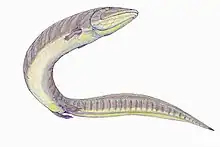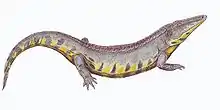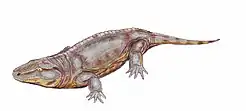| Calligenethlon Temporal range: Late Carboniferous | |
|---|---|
| Scientific classification | |
| Domain: | Eukaryota |
| Kingdom: | Animalia |
| Phylum: | Chordata |
| Order: | †Embolomeri |
| Family: | †Eogyrinidae |
| Genus: | †Calligenethlon Steen, 1934 |
| Type species | |
| †Calligenethlon watsoni Steen, 1934 | |
Calligenethlon is an extinct genus of embolomere reptiliomorph from the Late Carboniferous of Joggins, Nova Scotia.[1][2] It is the only definitively identified embolomere from the Joggins Fossil Cliffs and is the largest tetrapod to have been found preserved in lycopod tree stumps.[3]
References
- ↑ Steen, Margaret C. (September 1934). "The Amphibian Fauna from the South Joggins. Nova Scotia". Proceedings of the Zoological Society of London. 104 (3): 465–504. doi:10.1111/j.1096-3642.1934.tb01644.x. ISSN 0370-2774.
- ↑ Holmes, R.B.; Carroll, R.L. (2010). "An articulated embolomere skeleton (Amphibia: Anthracosauria) from the Lower Pennsylvanian (Bashkirian) of Nova Scotia". Canadian Journal of Earth Sciences. 47 (3): 209–219. doi:10.1139/E10-008.
- ↑ Godfrey, S.; Holmes, R.B.; Laurin, M. (1991). "Articulated remains of a Pennsylvanian embolomere (Amphibia: Anthracosauria) from Joggins, Nova Scotia". Journal of Vertebrate Paleontology. 11 (2): 213–219. doi:10.1080/02724634.1991.10011388.
This article is issued from Wikipedia. The text is licensed under Creative Commons - Attribution - Sharealike. Additional terms may apply for the media files.





